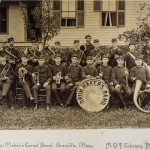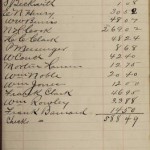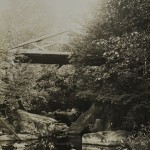
A year ago, I got the listing of new collections added to the Digital Commonwealth. I expect the Boston Public Library and UMass/Amherst to have extraordinary collections on Digital Commonwealth. I am much more impressed when a small institution, like the Granville Public Library (GPL), uploads a collection that is impressive in its depth and breadth. So naturally, I asked how this happened.
Mary Short, director of GPL, directed me to Dick Rowley, dedicated volunteer and raconteur. It has been a fun and educational year of discovering where Granville started and where they’ve gone. Dick has done all he could on his own, through crowd sourcing and with partners to restore the story of Granville’s history. My apologies to all concerned for my tardiness in posting this report.

Dick and his cousin, Thom Gilbert, were researching family history independently. They decided to meet up halfway between Dick in Connecticut and Tom in eastern Massachusetts in Granville, the family’s old hometown. They had discovered that the family had a connection to the Noble and Cooley Drum Company in Granville. (See payroll book, right.) This led them to the Noble and Cooley archives. That is, if you define archives as boxes and boxes of materials in no particular order.
Luckily, Dick and Thom “stumbled” onto the Massachusetts State Historic Records Advisory Board Roving Archivist program. If you are starting from scratch in organizing your historic collections, Dick says this is the program for you. Rachel Onuf was extremely helpful in getting the Noble and Cooley Center for Historic Preservation (NCCHP) on the right track. (Rachel has moved on and Sara Jane Poindexter is the current roving archivist.) Dick’s first experience with Digital Commonwealth (DC) was with the digitization of the NCCHP collection. They started with the company’s catalogs, which were a big hit with collectors, including Jay Leno. They went on to add correspondence, employee records, etc. And were they able to confirm the family connection with Noble and Cooley? Long lost payroll records dating back to 1890 were discovered showing that many ancestors had worked at the drum shop at one time or another, some from the age of 15.
Like any good genealogist, Dick and Thom became interested in the local history that went along with the family and corporate history they had already discovered. They realized for Granville history they should ask at the Granville Public Library. And there they came across a treasure trove of photos – of Granville people, places and things cared for by Rose Miller, long-time curator of the library’s Historical Room.
Dick recommended GPL contact Digital Commonwealth to digitize the collection. He was able to vouch for the helpful and patient staff. Dick had nothing but compliments for Nichole, Jake and Eben. All of whom he said went over and above the standard service. Still, GPL was hesitant to ship its original documents. The DC staff drove out to pick up and return the collection it, so GPL could relax.

GPL was even more reluctant to part with its photos. Dick offered and came through with a system whereby he digitized the photos using his personal camera, a home-made stand and extra lighting for the best TIF format images possible. Then he sent a USB drive to Digital Commonwealth. Although they were working with photos of photos, Dick thinks the images DC harvested were pretty close to the “gold standard” for digital images.
Not being trained archivists, Dick and Thom didn’t know much about metadata. However, they got a crash course from DC staff as well as attending New England Document Conservation Center (NEDCC) training events. They were then able to send spreadsheets with basic metadata and DC “did the rest.” In the end, the collaboration was a great success on all fronts.
Dick believes that restoring the story of Granville has two parts. Part I, as we have discussed here, was the organization and preservation of the historical source materials. Part II is documenting the stories of these materials, but that’s a story for another post.